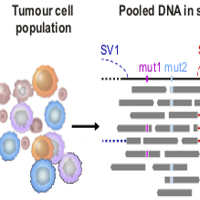Abstract
Ongoing cancer evolution gives rise to intra-tumour heterogeneity (ITH), which is a major mechanism of therapeutic resistance and therefore an important clinical challenge. However, the extent, origin and drivers of ITH across cancer types are poorly understood. Here, we extensively characterise ITH across 2,778 cancer whole genome sequences from 36 cancer types. We demonstrate that nearly all tumours (94.7%) with sufficient sequencing depth contain evidence of recent subclonal expansions, and that most cancer types show clear signs of positive selection in both clonal and subclonal protein coding variants. We find distinctive subclonal patterns of driver gene mutations, fusions, structural variation and copy-number alterations across cancer types. Dynamic, tumour type-specific changes of mutational processes between subclonal expansions shape differences between clonal and subclonal events. Our results underline the importance of ITH and its drivers in tumour evolution, and provide an unprecedented pan-cancer resource of extensively annotated subclonal events, laying a foundation for future cancer genomic studies.
